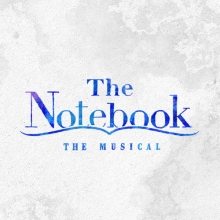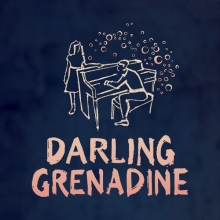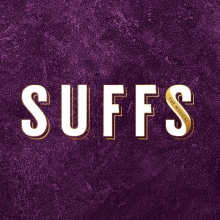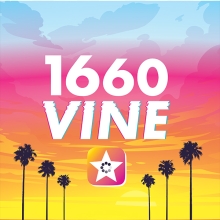
Full Synopsis
Act One
The show begins with a shocking tableau of our two protagonists, Bonnie Parker and Clyde Barrow, dead in the front seat of their iconic grey Ford Deluxe Sedan. We are then immediately taken back to Depression-era West Texas, with a young Bonnie at twelve years old, as she dreams of her life as a movie star, and a young Clyde, who dreams of a life like Al Capone and Billy the Kid ("Picture Show"). The two grow up, holding onto and pursuing these same dreams, although it appears to have led to nothing, as we come to find that neither has escaped their resent-filled lives in West Texas — Bonnie, a waitress at a diner, and Clyde, a frequent inmate at the county prison.
Clyde, who has just broken out of prison with his brother and partner-in-crime, Buck, discovers Bonnie, stranded on the side of the road with a broken-down car. The two dreamers connect almost immediately, as he fixes her car in exchange for a lift to Dallas ("This World Will Remember Me"). Meanwhile, Buck flees to his wife, Blanche, who urges him to turn himself back in so that once he has set things straight with the law and the Lord, they can start their lives afresh ("You're Goin' Back to Jail").
Bonnie and Clyde spend the next several days together. She shares her dreams of becoming a starlet, a poet and a singer. Clyde persuades her to sing for him ("How 'bout a Dance?"). Bonnie takes him back to her house to stay the night and hide from the law... although it is short-lived when Ted, police officer and friend of the Parkers, shows up to check on Bonnie and warn her of a loose prisoner who's been spotted in her area. This unexpected visit forces Clyde to flee, although not before he convinces Bonnie that both of their dreams will come true if they skip town together — his of a life without worrying about money, and hers of extraordinary fame. He tells her to meet him at his brother Buck's house, and takes off to retrieve him.
The brothers' reunion starts off sweet, thrilled to see one another again and talking of leaving town in the latest Ford car ("When I Drive"). However, when Bonnie arrives and Clyde urges his brother to join them on the road, Blanche forces Buck to confess his plans to return to prison, and an argument breaks out between the four of them. Their dispute grows to the point that Clyde slaps Bonnie for suggesting that he follow Buck and resign from his life as a criminal. Bonnie, in turn, slaps Clyde for mistreating her, and the two of them leave angrily.
Buck goes through with his plan to turn himself in, and authorities eventually catch Clyde, as well ("God's Arms Are Always Open"). Both Blanche and Bonnie visit their respective Barrow men and discover that Clyde has been facing continuous assault by fellow inmates, encouraged by the prison guards. Ted, on guard at the prison, finally realizes Bonnie's relationship with Clyde. He laments that he is the better man for Bonnie, while Clyde insists that his is the only love worthy of her ("You Can Do Better than Him").
The following night, on the eve of the Barrows' hearing, Blanche and Bonnie face the criticism of their friends and family for standing by their love for these criminals, but the women realize that they cannot help their adoration ("You Love Who You Love"). They find themselves with the rest of the Barrow clan, who come to hear of the Barrow brothers' fates: Buck to be released on good behavior and Clyde to serve another sixteen years for seven counts of robbery and a prison break.
Six months later, Bonnie visits a severely beaten Clyde, and the two plot to break Clyde out ("Raise a Little Hell"). Bonnie returns the next day with a gun hidden in her brassiere and leaves it with Clyde, who threatens to use it on the guard if he doesn't let Clyde go free. The prison guard obliges, and in no time, Clyde is back to stealing money to get by. While their friends and family react to the news of their great escape, Bonnie and Clyde take off in their 1931 roadster, excited and determined to fulfill their lifelong dreams ("This World Will Remember Us").
Act Two
The second act opens with a society torn between the righteousness of living under the law, and the sympathy of trying to live a better life in these harsh times ("Made in America"), showing that Bonnie and Clyde's criminal escapades have not only gained the attention of the press, but also the support of the general public. However, in a grocery store robbery gone wrong, Clyde kills a deputy who was "trying to be a hero." When Clyde comes clean to her about his accidental transition from robbery to murder, a hysterical Bonnie wants out but finds that she's too far from what her life used to be to go back ("Too Late to Turn Back Now"). The grocery store shooting only earns the two hero status throughout the country, with police in every Southern state in pursuit of them. Clyde sends sporadic letters to Buck and Blanche, writing of all the adventure and opportunity they've found for themselves on the road. Buck sees that this life could also be possible for his wife and him, and tries to convince Blanche that they should join Bonnie and his brother, but she refuses ("That's What You Call a Dream").
The notorious duo carry on their robbery spree, growing progressively more daring in their endeavors and taking on banks instead of stores ("What Was Good Enough for You"). Clyde even suggests that Bonnie send her latest poem about their story to a big newspaper to be published. This not only gains more fame for both of them, but also infuriates the Texas team of investigators to the point that Texas Governor Miriam Ferguson interferes and recruits retired Texas Ranger, Frank Hamer, to hunt down Bonnie and Clyde. In the middle of a disastrous bank raid, though, Clyde is shot in the shoulder. When he hears the news of his injured brother, in order to help Clyde, Buck leaves home... and Blanche, who's torn between her righteousness and her love for Buck.
Meanwhile, in their hideaway, the increasingly infamous couple share a tender moment ("Bonnie"), although it is quickly interrupted by Buck's arrival. A hesitant Blanche, who chose love over law after all, accompanies him. Days later, while Buck and Clyde are out for another robbery ("Raise a Little Hell – Reprise"), Blanche inquires how Bonnie can possibly be happy, living the way they do, as the two women anxiously await the brothers' return. Bonnie insists that she and Clyde are the only people truly living their lives to the fullest ("Dyin' Ain't So Bad"). The boys return safely, but the celebration is brief as they learn that the authorities have discovered their hideout and have them surrounded. A shootout follows, and, although Clyde and Bonnie escape successfully, Buck is fatally injured and dies in Blanche's arms. Blanche is arrested immediately ("God's Arms Are Always Open – Reprise").
While heading back to Dallas to visit their parents, a sporadic habit that the two have picked up, Clyde troubles over how his family will ever forgive him for abandoning Buck and leaving him to die. Bonnie assures him that Buck's death was not his fault, but both of them start to see that their famous adventures are coming to an end ("Picture Show – Reprise / Dyin' Ain't So Bad – Reprise"). All the while, Ted and the rest of the gang who are in pursuit of the legendary twosome discover their habit of visiting their parents. On May 23, 1934, on a road in Louisiana, Bonnie and Clyde are ambushed, marking the end of their fateful journey.
Show History
Inspiration
Bonnie & Clyde, with music by Frank Wildhorn, lyrics by Don Black and a book by Ivan Menchell, is a musicalized take on the true story of Bonnie Parker and Clyde Barrow, a pair of outlaws and lovers who gained notoriety during the Great Depression. Wildhorn had previously collaborated with Black on Dracula The Musical, and came to him about writing a song cycle based on Bonnie and Clyde's story. They came out with a thirteen-song demo that featured performances from Rob Evan, Brandi Burkhardt and Linda Eder; only five songs of the demo were kept for the musical itself. Wildhorn and Black's score is a hodgepodge of country and western (based on the Texas setting), blues and Broadway pop music.
Productions
Bonnie & Clyde started as an industry-only reading at the Roundabout Theatre Company with Laura Osnes and Stark Sands. The musical officially premiered at the La Jolla Playhouse on November 22, 2009, featuring the same two leads. A positive reception from the run in California led to a return engagement at the Asolo Repertory Theatre in Sarasota, Florida. It ran from November 19, to December 19, 2010, with Jeremy Jordan replacing Sands in the role of Clyde.
The success from Florida's production led the way for a run on Broadway at the Gerald Schoenfeld Theatre. With reprises from Osnes and Jordan, it opened on December 1, 2011. Despite a continued positive reception from audiences, low ticket sales prompted producers to announce that the show would close early. The run ended on December 30, after only 36 regular performances.
The musical has seen a handful of international productions. A Japanese-language production played in Tokyo from late 2011 to early 2012. On September 23, 2013, a Korean language production premiered in Seoul. Most recently, ArtsEd in Chiwick, London, staged the UK premiere from January 17-25, 2014.
Critical Reaction
"The diversity of Wildhorn's score... is undeniably impressive."
– The Los Angeles Times
"Nearly every scene and music number worked to paint a fresh, poignant portrait of the iconic outlaw sweethearts. ...Wildhorn's winningly eclecticscore covers everything from country and gospel to vintage pop and proto-rock. ...Black's lyrics make the memorable melodies come alive with rich,timeless language that does a near-perfect job of serving the period piece."
– The Bradenton Herald
"There is much to recommend in this show about the two fame-obsessed Texas outlaws in the early 1930s. [It has] ...a tune-filled score by Frank Wildhorn and lyricist Don Black."
– The Herald Tribune
"This is Wildhorn's most developed, most genuinely theatrical score."
– Newsday
"An arresting new musical.... The score has plenty to offer."
– Variety
"The creative team have endeavored to breathe contemporary relevance into the story by emphasizing the climate of hardship, economic struggle andinstitutional indifference that made Parker and Barrow into folk heroes."
– The Hollywood Reporter
Connect
Billing
- Music by
- Lyrics by
- Book by
Requirements
|
Book by
IVAN MENCHELL
(50%)
|
Lyrics by
DON BLACK
(50%)
|
Music by
FRANK WILDHORN
(50%)
|
Video Warning
In accordance with the Performance License, you MUST include the following warning in all programs and in a pre-show announcement:ANY VIDEO AND/OR AUDIO RECORDING OF THIS PRODUCTION IS STRICTLY PROHIBITED.
If you purchase a video license to allow non-commercial video recording of this production, then you MUST include the following warning in all programs and in a pre-show announcement:
ANY VIDEO RECORDING MADE OF THIS PERFORMANCE IS AUTHORIZED FOR PERSONAL, AT-HOME, NON-COMMERCIAL USE ONLY. THE SALE OR DISTRIBUTION OF SUCH RECORDING IS STRICTLY PROHIBITED UNDER FEDERAL COPYRIGHT LAW.
Included Materials
| Item | Quantity Included |
|---|---|
| LIBRETTO/VOCAL BOOK | 25 |
| PIANO CONDUCTOR'S SCORE | 2 |
Production Resources
| Resource |
|---|
| FULL SCORE VOL. 1 OF 4 |
| FULL SCORE VOL. 2 OF 4 |
| FULL SCORE VOL. 3 OF 4 |
| FULL SCORE VOL. 4 OF 4 |
| KEYBOARDTEK |
| LOGO PACK |
| LOGO PACK DIGITAL |
| LOGO TEES SIX-PACK ADULT LARGE |
| LOGO TEES SIX-PACK ADULT MEDIUM |
| LOGO TEES SIX-PACK ADULT SMALL |
| LOGO TEES SIX-PACK ADULT X-LARGE |
| LOGO TEES SIX-PACK ADULT XX-LARGE |
| LOGO TEES SIX-PACK CHILD LARGE |
| LOGO TEES SIX-PACK CHILD MEDIUM |
| LOGO TEES SIX-PACK CHILD SMALL |
| PRODUCTIONPRO-DIGITAL SCRIPT/SCORE |
| REFERENCE RECORDING |
| SCENE PARTNER |
| SCENIC PROJECTIONS |
| SCENIC PROJECTIONS PRO |
| SCENIC PROJECTIONS-ANIMATED |
| SCENIC PROJECTIONS-STILL |
| STAGE WRITE APPLICATION |
| TRANSPOSITIONS-ON-DEMAND |
| VIDEO LICENSE |
STANDARD ORCHESTRATION
| Instrumentation | Doubling |
|---|---|
| BASS | ACOUSTIC BASS , ELECTRIC BASS |
| DRUMS | BELL TREE , DRUM KIT , EGG SHAKER , GLOCKENSPIEL , MARK TREE , SHAKER , TRIANGLE , WOOD BLOCK , XYLOPHONE , 1-SHOT SHAKER |
| GUITAR | ACOUSTIC GUITAR , ELECTRIC GUITAR , LES PAUL GUITAR , 12-STRING GUITAR |
| GUITAR 2 | ACOUSTIC GUITAR , BANJO , DOBRO , ELECTRIC GUITAR , MANDOLIN , PEDAL STEEL GUITAR |
| KEYBOARD 2 | |
| REED 1 | ALTO SAXOPHONE , CLARINET , ENGLISH HORN , FLUTE , PICCOLO , SOPRANO SAXOPHONE |
| REED 2 | BASS CLARINET , CLARINET , TENOR SAXOPHONE |
| VIOLIN |




